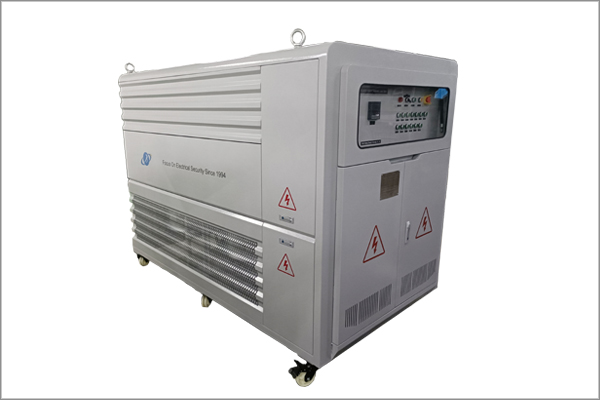AC Load Bank: The Pivotal Role in Power Testing
Time:2025-02-10
In modern power systems, the AC load bank serves as a crucial testing device, playing an indispensable role. It not only plays a key part in the performance testing, validation, and optimization of power equipment but also ensures the stability and reliability of power systems. This article aims to delve deeply into the core functions of AC load banks in power testing and reveal their significance.
An AC load bank is an electronic device capable of providing AC power, commonly used to simulate load conditions in power systems. It can mimic various load scenarios, such as resistive, inductive, and capacitive loads, thereby assisting engineers in comprehensively assessing the performance of power equipment. In power testing, the primary role of an AC load bank is to simulate current, voltage, and power parameters in real-load environments to test the output capacity, stability, and efficiency of power supply devices.
In generator performance testing, AC load banks play a vital role. Generators are core equipment in power systems, and their performance directly affects the stability of power supply. By simulating different load conditions using AC load banks, engineers can test generators' performance under full load, partial load, and sudden load changes. This testing ensures that generators can provide stable power in actual operation, preventing power interruptions due to load fluctuations.
Transformers, as key devices for voltage conversion and power distribution in power systems, also require AC load banks for verifying their load capacity. By simulating the actual load of transformers, AC load banks help engineers verify their efficiency and temperature rise under different load conditions. This testing is crucial for ensuring the long-term stable operation of transformers, especially under high loads, where transformer performance directly relates to the safety of power systems.
In critical facilities such as data centers and hospitals, uninterruptible power supply (UPS) systems are essential for ensuring uninterrupted power supply. AC load banks can simulate load conditions during power outages, testing UPS systems' switching times, power supply capabilities, and battery performance. Such testing ensures that UPS systems can respond promptly in emergencies, safeguarding the normal operation of critical equipment.
Moreover, AC load banks play an important role in distribution system optimization and renewable energy system testing. By simulating different load distributions, engineers can assess the load balancing capabilities of distribution systems, identify potential bottlenecks and weaknesses, and optimize the design of distribution systems accordingly. In renewable energy systems, AC load banks can simulate the output characteristics of renewable energy systems, helping test their performance under different load conditions and ensuring compatibility and stability between renewable energy systems and traditional power systems.
The reason AC load banks can play such a significant role in power testing lies in their advantages of high-precision simulation, flexible configuration, safe data recording, and energy conservation and environmental protection. They can accurately simulate various load conditions and provide comprehensive performance assessments. Meanwhile, AC load banks can be flexibly configured according to different testing needs, suitable for various testing scenarios. Their built-in protection mechanisms can effectively prevent accidental situations such as overload and short circuits, ensuring the safety of the testing process. Modern AC load banks are also typically equipped with data recording and analysis functions, capable of recording various parameters in real-time during the testing process, such as voltage, current, and power, providing in-depth analysis and optimization insights for engineers.
In summary, AC load banks play a pivotal role in power testing. They not only ensure the performance and stability of power equipment but also improve the overall efficiency and reliability of power systems. As the complexity and scale of power systems continue to increase, the importance of AC load banks will become increasingly prominent. In the future, with the introduction of intelligent technology, AC load banks are expected to play an even greater role in power testing, providing stronger support for the development of the power industry.
News Recommendation
-
 2024-09-11
2024-09-11TRIUMPH LOAD EXHIBITING AT Enlit Europe 2024 -BOOTH 7.H08
-
 2023-04-21
2023-04-21TRIUMPH LOAD EXHIBITING AT DATA CENTER WORLD GERMANY 2023-BOOTH F909
-
 2023-04-06
2023-04-06TRIUMPH LOAD EXHIBITING AT ELECTRIC POWER TECH KOREA 2023 – Booth G109
-
 2022-05-05
2022-05-05What is the role of ac load bank for power supply?
-
 2022-05-05
2022-05-05What is the role of the load bank?


